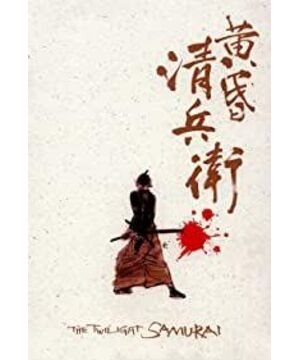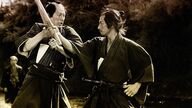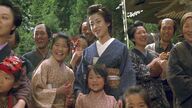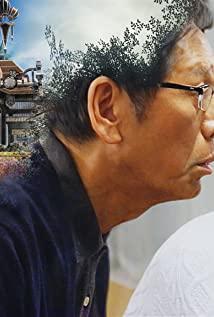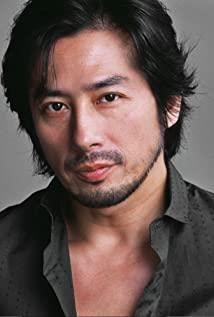From the first dialogue, it can be heard that Yuwu Shanemon has a certain understanding of Iguchi, and he calmly invites wine to chat is just a means of defeating the enemy, and a very old-fashioned means.
Yuwu Shanemon went back and forth to hell several times. At the end of the shogunate, a samurai could experience all the misery. If the desire for life is not strong, I may not be able to support it. It is so strong that the spirit of Bushido is shaken like a stone, and the benefactor falls into hell. Faith and even the moral system completely collapsed, which was the extreme fate of the samurai in this era. He took a porcelain cup and said to Iguchi that it contained my daughter's ashes, and then began to taste the contents of the cup. The desperation was so obvious that it was like a ritual, a numb tribute to the disintegrated belief and moral system. Such a person is already inhuman, an out-and-out trapped beast, he will not long for a romantic end, but is just waiting for an opportunity.
Iguchi doesn't want to kill at all. His killing intent has been worn down by years of mediocre life. He was driven by a simple samurai spirit, and he simply executed an order. When Yuwu Shanemon said to let me live. , his determined expression immediately became dazed, when Yuwu Shanemon finished talking to him, he simply started laughing with a relaxed expression, completely forgetting that there was a master murderer in front of him without blinking, and then Yuwu Shanemon suddenly The change of mind was going to take his life, so he panicked. Fortunately, he had a good foundation and fought a few rounds, but it was obvious that he was not an opponent. The final decisive victory was a bit incredible. At the entrance of the well, the long knife was blocked by a very low beam in the house. Immediately at the entrance of the well, a cut in the lower abdomen slid aside and the outcome was decided.
The impact of this duel is not reflected in the film. It seems to be an ordinary episode of life. After the short reunion time is over, Xuanye's narration. Iguchi died in a civil war, so I painted Iguchi's life lightly. A full stop, the ordinary is heartbreaking. He is just a bubble in the turn of the times, a tragic figure with romantic ideas.
He is very cute in many places in the film. At the beginning of the film, Jingkou returns home in the evening to greet his mother, but the mother is so demented that she asks who he is. He is not distressed or extremely depraved. He just jokes helplessly. At this point, I fell in love with this character, because it was a bit warm and a bit desolate in my heart. One night when he was weaving the worm cage, he was very excited to hear his daughter recite the Three Character Classic. He happily said that he missed the time when he recited the Three Character Classic before, and then followed his daughter to read it. The daughter asked him why I didn’t go to study tailoring to make money but study, but he couldn’t answer why. After thinking about it for a long time, I said that reading can only lead to thinking, and people must have thinking. Who would have thought that a samurai could be so kind and open-minded, and when he looked back at this scene, his eyes became a little hot. Because he didn't take a bath, he smelled the lord who came to inspect. The uncle came to ask the teacher to ask for the guilt. By the way, he mentioned the matter of renewing his string. He said that he had found him a daughter of the village chief. He politely refused, and the uncle asked him why. He said a romantic and outrageous remark. The uncle said it inexplicably and was extremely depraved. This part is particularly interesting.
Iguchi reminds me of Kenshin, he is not as perfect as Kenshin, but he is a super warrior with a calm heart and longing for a peaceful life. Kenshin is the return of the tyrant, advancing with the times and having undergone a painful transformation process, but finally found it. It is a romantic product of kindness and peaceful victory. Unlike Iguchi, he has never been a tyrant. He carefully plays the role of a samurai. Fifty dan, still overdrawn, lived in poverty, and was forced by the current situation to become a so-called hero, and finally died in the civil war. The ending was helpless and miserable. It was a tragedy created by that era.
I thought of the nest of ants in the corner of the kitchen at home. When I was about to pour a ladle of boiling water over it that day, I suddenly thought of a voice "We just want to live in our own way", which was very interesting at the time, but the water was still poured over.
View more about The Twilight Samurai reviews


